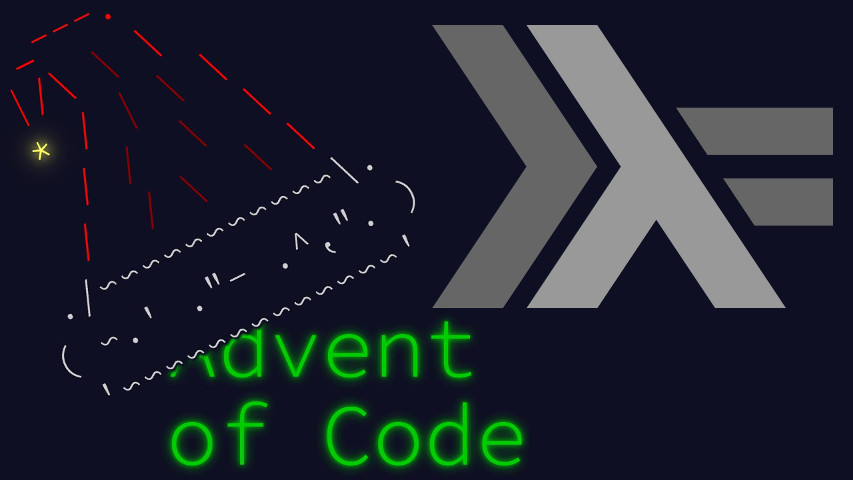For day 14 of Advent of Code, “Extended Polymerization”, we are to repeatedly double a string by inserting a specific character between each pair according to a given ruleset. This post is your usual literate Haskell, so let’s import what needs be and get started.
import Control.Arrow ((&&&))
import Data.List (group,sort)
import Data.Map.Strict hiding (map,lookup)The rule format is a simple “between such pair of characters, insert this new character”.
type Rule = ((Char,Char),Char)For part 1, we are to double the string 10 times. So let’s do just that.
part1 :: String -> [Rule] -> Int
part1 polymer rules = (format . tally . (!! 10) . iterate step) polymer
where
step (a:bs@(b:_)) | Just c <- lookup (a,b) rules = a : c : step bs
step [x] = [x]
tally = map length . group . sortThe step function pattern-matches the string head, looks
up the pair, replaces and recurses. The tally function
lazily delegates to list sorting and grouping operations, which is
slightly suboptimal, but so much easier to write out.1
The rest of the checksumming process will be shared with part 2, so I’m heaving it up to a top-level function.
format :: Foldable f => f Int -> Int
format = uncurry (-) . (maximum &&& minimum)For part 2, the question is the same, the difference is we are to iterate 40 times.
It’s not a trivial difference. My starting polymer template is 20 + 1 characters long, so whereas iterating 10 times resulted in a 20 × 210 + 1 ≈ 20Ki character long string, iterating 40 times brings that figure to 20 × 240 + 1 ≈ 20Ti characters, which definitely won’t fit in my RAM.
Luckily, we’re not asked for the resulting polymer, only statistics about its constituting elements. So let’s reason directly on those.
Iteration is based on the pairs’ structure, so that’s what we’re going to keep.
part2 :: String -> [Rule] -> Int
part2 polymer rules =To convert a polymer structure to its list of constituent pairs, I’ll use the same reader monad trick I expanded on day 1.2 And feed it to a map.
let
pairs = fromListWith (+) . flip zip (repeat 1) . (flip zip =<< tail)To convert back to a simple tally, I’ll just add both components of a map’s key. A slight adjustment is necessary for the endpoints, as they’re part of one fewer pairs than the others.
unPairs = fmap (`div` 2) .
adjust (+1) (head polymer) .
adjust (+1) (last polymer) .
uncurry (unionWith (+)) .
(mapKeysWith (+) fst &&& mapKeysWith (+) snd)The adjusted stepping function then performs the same lookup as in part 1, just limited to once per pair type.
polymerStep = unionsWith (+) . map pairStep . assocs
pairStep ((a,b),n) | Just c <- lookup (a,b) rules
= fromListWith (+) [((a,c),n),((c,b),n)]Bringing it all together:
in
(format . unPairs . (!! 40) . iterate polymerStep . pairs) polymerIt’s worth reflecting a bit at this point. We’re evidently facing a linear transformation again, so why am I not building up its transformation matrix and applying exponentiation by squaring? The answer is that while it would work, we’re not iterating enough times for it to be a problem. What made the problem intractable using the brute force approach was to keep the pairs’ ordering, but once we’re past that, our (kinda naïve) step function is still O(rules2), which is small, iterated 40 times, which is still small. I’ll get my matrices back out when the iteration count reaches the millions.
The wrapping doesn’t warrant too much explanation.
parse :: String -> (String,[Rule])
parse (lines -> polymer:"":rules) = (polymer,readRule <$> rules)
where readRule (words -> [[a,b],"->",[c]]) = ((a,b),c)
main :: IO ()
main = interact $ show . (uncurry part1 &&& uncurry part2) . parseThis concludes today’s solution. See you tomorrow!



